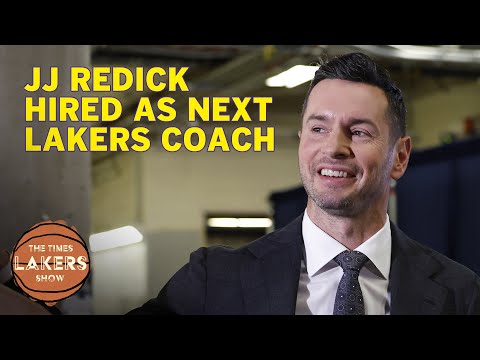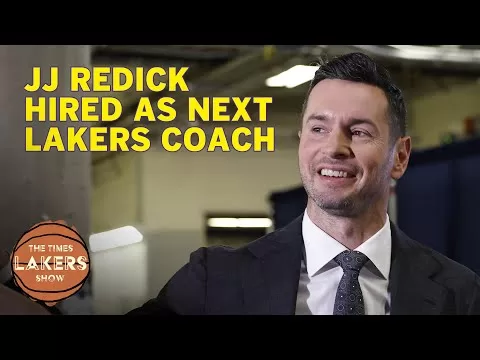A rival general manager told The Times that usually when a team fires a coach, as the Lakers did with Darvin Ham more than a month ago, it already has one or two candidates in mind.
And that could be true, with the Lakers and Pelinka confident Redick would be the right guy for their team as it’s about to enter a critical stage. But how?
Redick, of course, has no coaching experience beyond his son’s youth team. His credentials include things he first accomplished as a player and later as a podcaster and broadcaster.
Surely, he’d need to convince the Lakers those things could translate, and the need to convince them should’ve kept him from being the near-consensus choice to be the team’s next coach.
It didn’t. Thursday, he agreed to a four-year deal to coach the Lakers, according to people with knowledge of the hire.
But if the journey from Ham’s firing to Redick’s hiring was on a line, it was not a straight one. There was a surprise formidable candidate, a push for someone with more experience that included secrecy and confusion.
It ended with Redick, and soon that’ll be all that matters. But for now, figuring out how the Lakers got here is just as important.
Either the Lakers always wanted Redick or they wanted Dan Hurley? Or they wanted Redick then Hurley then Redick again? Or maybe they wanted both all along and just one more than the other?
Depending on whom you listen to, the journey was either pretty straightforward or it was overly complicated and full of unnecessary drama.
The truth? It was all of the above.

Before you can understand why and how the Lakers landed on Redick from seemingly out of nowhere, it’s important to remember why they were looking for a coach in the first place.
In two seasons with the Lakers, Ham had achieved about as much as you’d want out of a rookie head coach. He guided the Lakers to the Western Conference finals in Year 1. And in Year 2, the Lakers won the inaugural in-season tournament, played good basketball minus a long December and were perceived as a serious threat.
Internally, though, players had lost faith in Ham — too much experimentation, too many opponents’ runs swelled without triggering Ham to call timeouts, too many questions about his strategy and adjustments.
On May 3, days after they were eliminated by Denver in the playoffs for a second consecutive year, the Lakers fired Ham.
One week later, Pelinka and the Lakers’ scouting staff were in Chicago for the NBA draft combine. The messaging from the top of the organization was that the team would cast a wide net and move deliberately in searching for a new coach.
The Lakers would consider top assistant coaches around the league, including Denver’s David Adelman, Boston’s Sam Cassell and Minnesota’s Micah Nori. They’d circle back on candidates from previous searches, including Kenny Atkinson. And they’d even consider going way outside the box with Redick, who was a surprise candidate for the Charlotte Hornets coaching job.
But nearly everyone else who spoke to The Times — general managers from other teams, player agents, scouting directors and consultants — all quickly pointed to Redick, some going as far to say that they believed the search was already done. Rumors of extended meetings involving Pelinka and Redick in Chicago were one hot topic around the lobby bar and in the arena concourse.
The speculation was usually centered on three factors. One, the Lakers were looking for someone with strong tactical ability, and Redick’s reputation as a basketball brainiac had only grown since he retired as an NBA player in 2021. Two, there was a lot of confidence in Redick’s ability to sell himself as a coach to the Lakers because of his polish as a communicator. And three, there was his podcast that really highlighted the first two things.
And it was co-hosted by LeBron James.
Lakers star LeBron James is introduced before a game against the Detroit Pistons on Feb. 13.
(Gina Ferazzi / Los Angeles Times)
James’ role in the coaching search has been good for the talk shows, an easy connect-the-dots solution to the Lakers’ decision to go so unconventional with the hire.
The chemistry between James and Redick, players who competed against each other for the entirety of Redick’s 15-year NBA career, is undeniable on camera. The two seem to see basketball the same way, committed to a level of basketball discussion that extends beyond the usual surface discourse.
But Redick’s ascent to a favorite in the coaching search came without James’ urging. People with knowledge of the situation who aren’t authorized to discuss it publicly insist that James hasn’t been involved with the search. The messaging, both publicly from his representatives and privately from within the Lakers’ inner circle, has been that this search should be more focused on Anthony Davis (who doesn’t co-host a podcast with anyone and is under contract through 2027-28) than James.
In fact, before the first episode of “Mind the Game,” James and Redick had no real relationship to speak of, according to those who are aware of the situation.
Still, the show had to give the Lakers ideas.
It’s Redick, a coach’s whiteboard in front of him, talking strategy with James and disarming James when they disagree. It’s information the Lakers would’ve been foolish to not have taken stock of.
Even James’ pending free agency should he opt out of his deal probably didn’t complicate things. The general sense among people across the NBA is that James will ultimately return to the Lakers on what could be the final contract of his career.
Another factor came to light deep into the search, the Lakers seemingly locked in on Redick while he was preparing to call the NBA Finals for ESPN/ABC.
Pelinka and the Lakers were talking to other people.
Whether these things were motivated by a desire to make the Lakers’ search seem legitimate is, at best, secondary when you consider two things that actually occurred.
One, the first candidate to actually receive the full interview treatment was New Orleans assistant coach James Borrego, a well-regarded, intelligent coach who had some levels of success in Charlotte in a less-than-ideal situation.
Borrego left the Lakers impressed (and without a job offer), but there were people around the team who were advocating for him in the early stages of the search process, people with knowledge of their sentiments told The Times.
And then, on the morning of Game 1 of the Finals, a bombshell story shook the NBA world.
The Lakers had been talking, quietly, with Connecticut head coach Dan Hurley about the prospect of luring him from the reigning two-time NCAA champion.
Connecticut coach Dan Hurley turned down an offer to coach the Lakers.
(Frank Franklin II / Associated Press)
According to people with knowledge of those talks, they began “organically” in Chicago, when Hurley was in town with his former players who were there for the draft combine.
While still interested in Redick, the Lakers went to Hurley first because of his experience as a head coach.
The interest was sincere enough that Hurley and his wife flew to Los Angeles to meet with the Lakers. And it was sincere enough for Hurley to cross the next major threshold in the Lakers’ search — he was offered the job.
The contract — six years and $70 million — would’ve been rich enough to make Hurley the sixth-highest paid coach in the NBA (Hurley would’ve become the fifth highest-paid coach had he taken the job after the Pistons fired Monty Williams on Wednesday).
Hurley, in a bizarre media tour that took place after he turned the Lakers down, spoke about wrestling with the decision, even trading text messages with James, who in a twist had once praised Hurley’s systems in a social media post after the coach appeared on another of Redick’s podcasts.
However, the speculation about a bigger contract — some thought it could be seven years and as much as $110 million — made the Lakers look either cheap or ill-prepared when it came down to knowing what it would take to get him to leave college.
Hurley himself acknowledged there was probably a number that existed that could’ve gotten it done.
Bruised from the failed, public proposal, the Lakers regrouped and quickly got back on the road that everyone thought they were already on with Redick.
After the immediate dissection of the hire, the process won’t matter. The results will. And Thursday, as the Lakers finally got their coach on board, there’s real optimism that Redick can pull this off.
The Lakers love Redick’s potential, the way he sees and speaks the game while not being burdened with habits built coaching in a league that doesn’t exist anymore. He has pointed to his adaptability before in interviews when discussing his potential interest in a move to the sidelines.
They believe Redick can not only be a coach who can learn quickly now, but one forward-thinking enough to help them as an organization as they lean more into internal development and the technologies and strategies that can aid in that.
These are things they wanted from Hurley, traits that they liked in Hurley. And the Lakers say they like them in Redick, too.
Now, the organization will look to bolster the coaching talent around him with experienced assistants. Sources with knowledge of the team’s plans say the hope is to hire at least two coaches with head coaching experience.
Ultimately, the Lakers’ coaching search ended on Redick — the place where people around the league were sure it would eventually conclude.
The path was unorthodox, but that’s neither here nor there. Redick is the coach, the risk the Lakers decided to take.
The past won’t matter much once the games start — the future deciding whether this was all worth it.
